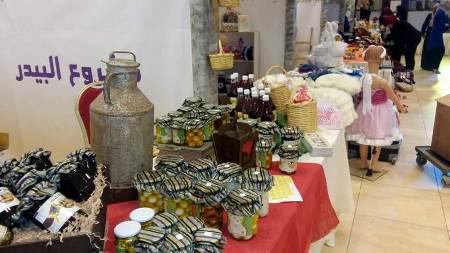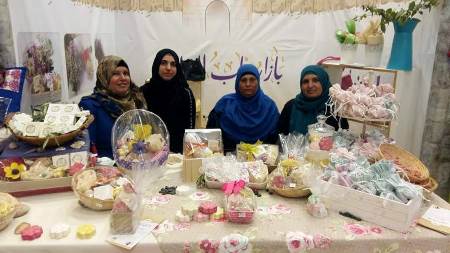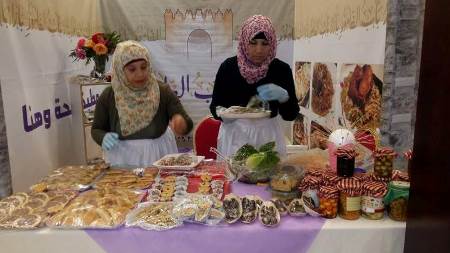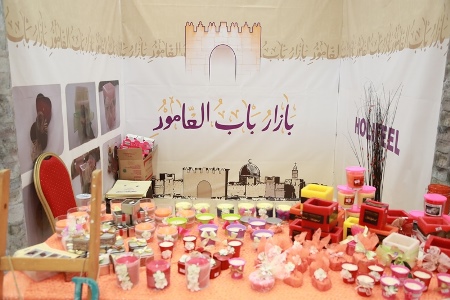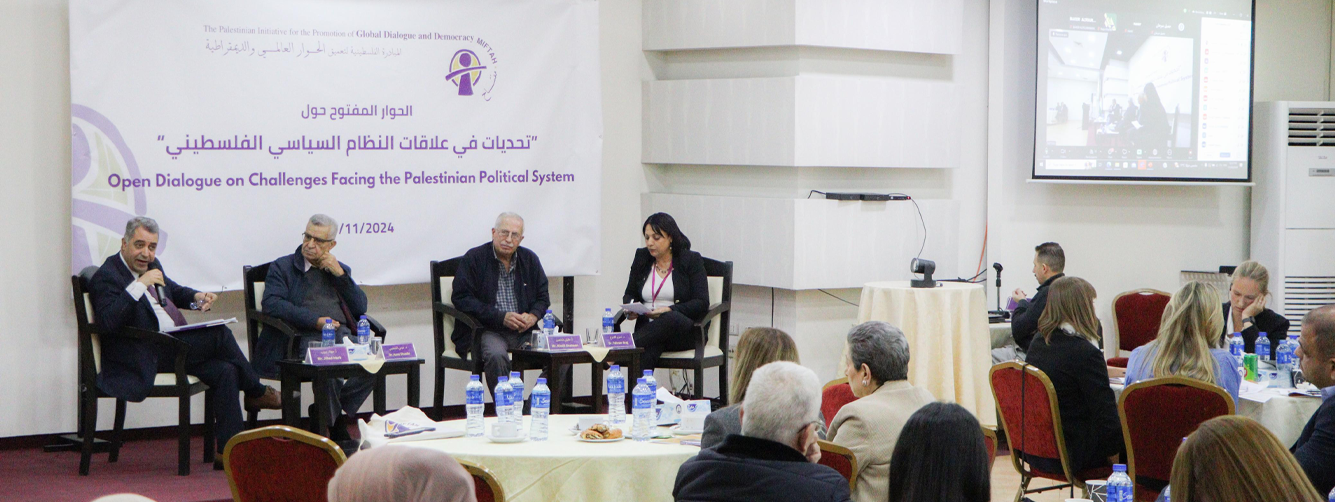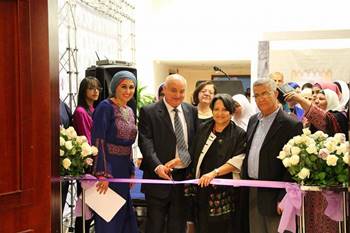
Under the sponsorship of the Arab Fund for Economic and Social Development, MIFTAH capped off its “Bab Al Amoud” [Damascus Gate] Bazaar as part of its project, “Supporting Jerusalem women through small income-generating projects”. The bazaar opened its doors on May 9 for two days at the Elite-Padico House in Ramallah with the participation of several Jerusalemite women beneficiaries who live in marginalized areas, especially near the separation wall or Israeli settlements.
Success Stories
Over the two days, the bazaar received several visitors and successfully helped the women to market their products, which included embroidered pieces, accessories, soaps and clothing and homemade food.
Hanan Said, MIFTAH’s project’s coordinator, said the success of the bazaar was due to the fact that the beneficiaries were given the opportunity to network and coordinate with companies, institutions and individuals to market their products. The Baydar project for dairy products for example, signed a contract for the purchase of their products. The Attara [herbs and spices] project in Beit Surik also signed similar contracts with companies and individuals to prepare food packages to sell as gifts during Ramadan in major stores in Ramallah. Other special orders were placed for various products from the bazaar by individuals, companies and institutions, Said mentioned. She continued that MIFTAH is looking to institutionalize these projects and register them with chambers of commerce so their products could then qualify for export. This is also due to the fact that MIFTAH is invested in the continuation of the projects and support for them.
Opening day
The bazaar’s grand opening was on May 9, with the participation of Najjad Ghannam, representative of the Arab Fund at the Welfare Association. He kicked off the bazaar with a minute of silence in support of prisoners and their demands in tandem with the Palestinian national anthem.
CEO Dr. Lily Feidy then welcomed the attendance, giving mention to the prisoners on hunger strike in Israeli jails and reaffirming full support for their just and humanitarian demands represented in a booth at the bazaar named “Salt and Water.” She noted that wives and mothers of prisoners were participating in the bazaar’s various booths. Feidy then thanked the Arab Fund for its support and sponsorship of the project and its representative Najjad Ghannam for participating in the opening ceremony. Feidy thanked MIFTAH’s employees who worked as a ‘united team’ to prepare for the bazaar, which she said was MIFTAH’s contribution to supporting and empowering Jerusalemite women.
Coordinator Hanan Said then delivered a speech in which she explained the goal of the project, commending the efforts of the targeted women. “The Bab Al Amoud Bazaar is the culmination of and support for the products of targeted women from the grant, which will promote their role, their creativity and steadfastness as women of Jerusalem.” Said continued, “How we wished we could have organized this bazaar at the actual Damascus Gate, one of the most beautiful gates in Jerusalem and the main entrance into its Old City.” This was not possible, she maintained, because the Israeli occupation on our land continues to disturb the natural pace and harmony of our lives by dividing us. That is why we set up a replica of Damascus Gate to capture its spirit and soul. And from here, just a few kilometers away from Jerusalem, we kick off our celebration of the accomplishments of women who have faced the shackles of prison guards, the policy of destruction, marginalization and exclusions and are now standing at the threshold of hope for a better tomorrow, for freedom, enlightenment, equality and creativity.”
Najjad Ghannam: More support
Before the official opening of the bazaar, Arab Fund representative at the Welfare Association Najjad Ghannam conveyed the Fund administration’s greetings to MIFTAH. On behalf of civil society institutions, he thanked the Fund’s administration for its continuous support, the most recent of which was $50 million earmarked for Jerusalem and its institutions. “We hope this project continues and develops”, he said, expressing his willingness to offer more support in the future.
Cutting the ribbon
This was followed by the official opening of the bazaar, in which Dr. Lily Feidy, Dr. Azmi Shuaibi and Mr. Ghannam cut the ribbon. People then began visiting the booths and the women’s products. The booths included: Sawa’ed Al Quds [Jerusalem Arms]/ embroidery; Sanabel Reef/honey; Salon Nisreen/ beauty salon; grape leave rolling project; olive oil soap; the Baydar project/dairy projects; Eva project/sewing; Amal and sewing project; the Sahha ou Hana [Bon Appetite] Kitchen; Jerusalem delights Kitchen; Khayrat Baladi frozen products; wax project; jewelry and silver project; [Attara] Herbs and Spices project; Ceramics home supplies project; handicrafts, homemade products and traditional clothing.
The bazaar’s opening included a fashion show of traditional Palestinian clothing produced by the Jerusalemite women. Two women modelled the traditional dresses representing various areas of Palestine. It also included wings showcasing earthenware products, homemade food and embroidery. Some of the women beneficiaries were wives of prisoners such as Rifat Zeidan from the village of Bir Nabala northwest of Jerusalem whose husband, Nizar Aziz Zeidan is serving a 38-year prison sentence, of which he has served 15 years.
A prisoner’s wife
Rifat Zeidan, along with a group of women in her village, are part of a soap producing factory, supported and funded by MIFTAH, which also trained them on project management. “This project has opened up important horizons for supporting families truly in need of help, especially since the women involved are the wife of a prisoner and women who fully support or help to support their families along with their husbands. The most important part of this is helping us market our products, which is a real challenge, but we are confident that MIFTAH’s support will help us overcome this hurdle,” Zeidan said.
Noora Mustapha: A dream of globalizing our popular heritage
Noora Issa from Essawiyeh, who is a fashion designer and one of the beneficiaries of the clothing project in her village says this project has been her life’s dream. Noora studied fashion design and dreams of becoming a global success in this field. She wants to present traditional Palestinian design in a more elevated way to the world, which is why she refuses to showcase her designs in any way that does not portray Palestinian heritage with class and finesse.
Noora thanked MIFTAH for its support of her collection and said she believes the bazaar is a huge opportunity for them. Still, she voiced the concern of other women, which is the need to help them market their work through social media and other means or through direct marketing whether in local or external markets. She added that many world designers are very interested in Palestinian fashion.
Supporting women: an ongoing process
MIFTAH began its income-generating project in 2008 with funding from the Arab Fund for Economic and Social Development. At the time, it targeted the Jerusalem district in particular to support marginalized women and contribute to promoting their steadfastness and improving their living and family conditions. The second goal of the project was to impact social culture in favor of supporting the leadership role of women in rural areas. For this reason, women were decision-makers in choosing the women to run these private endeavors, supported by grants from MIFTAH.
